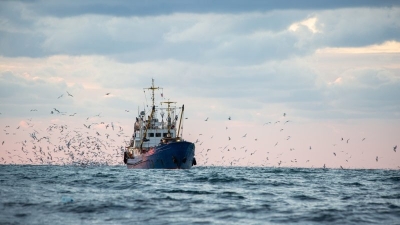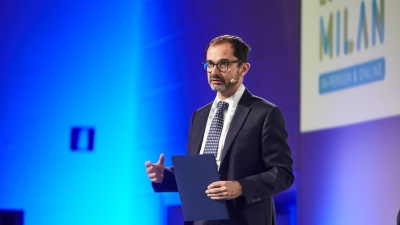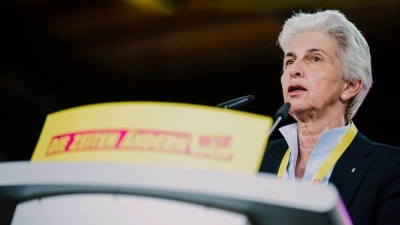Facing a squeeze, centre-right parties defy EPP’s elections plan

National centre-right parties used the European People’s Party’s (EPP) congress on Wednesday (6 March) as a platform to air grievances on national issues and rebel against the party line, as many feel the squeeze of home voters’ swing to the far-right.
The EPP gathering in Bucharest is the party’s kick-off event for their June EU electoral campaign: on Wednesday, delegates approved their election manifesto, and on Thursday they are expected to confirm European Commission President Ursula von der Leyen as the party’s lead candidate.
While the party is all but certain to keep its position as the strongest force in the European Parliament, the situation for many national members looks less rosy, as they are facing intensifying competition from the far-right.
National parties’ agitation was evidenced in a few prominent rebellions against the EPP’s notoriously well-oiled election machine, which saw member parties sacrificing harmony to push national talking points.
Notably, Austria’s ÖVP announced on Wednesday morning, just before the start of the congress, that the party’s delegates would not vote in favour of the EPP manifesto.
The party was opposed to the manifesto’s support for nuclear energy, the extension of the Schengen area of border-free travel to EU members Romania and Bulgaria, and the watered-down language on green policies, the party’s general secretary Christian Stocker later told journalists at the congress.
Just a day earlier, the French Les Républicains (LR) had raised eyebrows by announcing their opposition to the nomination of von der Leyen as EPP lead candidate.
Von der Leyen embodied the “technocratic drift” of the EU away from “the people of Europe”, the Républicains’ president Eric Ciotti wrote in a letter to EPP president Manfred Weber, seen by Euractiv.

French right opposes von der Leyen’s re-run for EU Commission
France’s conservative party Les Républicains (LR, EPP) will not support Ursula von der Leyen’s bid to get a second term as European Commission president, François Xavier-Bellamy, head of the LR list for the EU elections, told France Inter radio on Tuesday (20 February).
A Les Républicains official claimed, however, that they were not alone in their opposition, as “many colleagues, and a substantial number in fact, including German colleagues, (…) have thanked us for being the spokesperson for their own reservations.”
“It’s not all smooth sailing, that’s for sure,” the official said, adding that discussions should not be “swept under the carpet”.
Centre-right feeling the heat
Disappointing polling for both the ÖVP and LR suggests a link between the rebellions and difficult national situations for the centre-right in some countries.
Austria and France are notably two of three EU countries where EPP parties have lost their top spots in the right-leaning camp to the far-right ID party family, as an analysis by the Konrad Adenauer Foundation (KAS) published on Wednesday showed.
Prioritising national issues is a particularly urgent concern for the ÖVP, as Austrians will head to the polls in a general election by autumn this year.
In response, Weber told reporters the ÖVP’s reservations were “an Austrian challenge”, highlighting that other Austrian parties were also opposed to the Schengen extension. Nuclear energy is similarly unpopular in the country.
Meanwhile, LR’s attempts to distance itself from von der Leyen come amid pressure from both French President Emmanuel Macron and the French far-right.
“It cannot be said that she has sought to cultivate a special bond with the EPP over the years,” Les Républicains leader François-Xavier Bellamy told Euractiv, slamming the Commission president having been too close with Spain’s socialist Prime Minister Pedro Sánchez and Emmanuel Macron.
The ÖVP and the Républicains are paradigmatic examples of EU centre-right parties fighting long-term slides in the polls while being squeezed by a rising far-right.
While the KAS analysis highlighted that EPP parties are leading the polls in 11 EU countries, it also showed that its members failed to exceed a 20% share of the vote in just as many countries at the most recent parliamentary elections.
Other parties under pressure, too
Among the struggling members are once-powerful parties like Forza Italia in Italy and the CDA in the Netherlands.
Even EPP parties in Portugal and Spain, which are leading national polls, have lost voters to far-right competition over the last decade.
National concerns are also driving reservations of Polish and Romanian members against much-touted collaboration between the EPP and members of the ECR. Romania’s PNL is feeling the heat of an increasing far-right party AUR, which has signalled its intention to join ECR, while Poland’s Civic Platform is up against ECR’s PiS.
In the south, the main battle of the Spanish Partido Popular (PP) is against Sánchez and his Catalan nationalist allies.
In turn, the Spaniards were also keen to use the congress to discuss national issues rather than weighing in on European topics. Amongst others, the PP irrupted the congress to push for a rule of law resolution targeting Spain’s alleged eroding rule of law due to Sánchez’s deal with the Catalans.
[Edited by Nathalie Weatherald]
Read more with Euractiv




